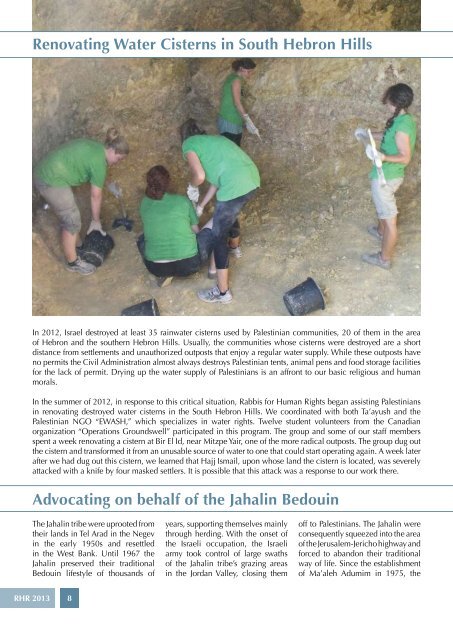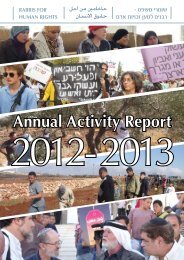Rabbis For Human Rights: The Annual Report 2012-2013
Rabbis For Human Rights: The Annual Report 2012-2013
Rabbis For Human Rights: The Annual Report 2012-2013
You also want an ePaper? Increase the reach of your titles
YUMPU automatically turns print PDFs into web optimized ePapers that Google loves.
Renovating Water Cisterns in South Hebron Hills<br />
In <strong>2012</strong>, Israel destroyed at least 35 rainwater cisterns used by Palestinian communities, 20 of them in the area<br />
of Hebron and the southern Hebron Hills. Usually, the communities whose cisterns were destroyed are a short<br />
distance from settlements and unauthorized outposts that enjoy a regular water supply. While these outposts have<br />
no permits the Civil Administration almost always destroys Palestinian tents, animal pens and food storage facilities<br />
for the lack of permit. Drying up the water supply of Palestinians is an affront to our basic religious and human<br />
morals.<br />
In the summer of <strong>2012</strong>, in response to this critical situation, <strong>Rabbis</strong> for <strong>Human</strong> <strong>Rights</strong> began assisting Palestinians<br />
in renovating destroyed water cisterns in the South Hebron Hills. We coordinated with both Ta’ayush and the<br />
Palestinian NGO “EWASH,” which specializes in water rights. Twelve student volunteers from the Canadian<br />
organization “Operations Groundswell” participated in this program. <strong>The</strong> group and some of our staff members<br />
spent a week renovating a cistern at Bir El Id, near Mitzpe Yair, one of the more radical outposts. <strong>The</strong> group dug out<br />
the cistern and transformed it from an unusable source of water to one that could start operating again. A week later<br />
after we had dug out this cistern, we learned that Hajj Ismail, upon whose land the cistern is located, was severely<br />
attacked with a knife by four masked settlers. It is possible that this attack was a response to our work there.<br />
Advocating on behalf of the Jahalin Bedouin<br />
<strong>The</strong> Jahalin tribe were uprooted from<br />
their lands in Tel Arad in the Negev<br />
in the early 1950s and resettled<br />
in the West Bank. Until 1967 the<br />
Jahalin preserved their traditional<br />
Bedouin lifestyle of thousands of<br />
years, supporting themselves mainly<br />
through herding. With the onset of<br />
the Israeli occupation, the Israeli<br />
army took control of large swaths<br />
of the Jahalin tribe’s grazing areas<br />
in the Jordan Valley, closing them<br />
off to Palestinians. <strong>The</strong> Jahalin were<br />
consequently squeezed into the area<br />
of the Jerusalem-Jericho highway and<br />
forced to abandon their traditional<br />
way of life. Since the establishment<br />
of Ma’aleh Adumim in 1975, the<br />
expanding settlement has repeatedly<br />
displaced Jahalin encampments.<br />
<strong>Rabbis</strong> for <strong>Human</strong> <strong>Rights</strong> has been<br />
advocating on behalf of the rights of<br />
the Jahalin Bedouin since 1997 when<br />
an encampment was demolished,<br />
and the Jahalin were given shipping<br />
containers to live in on an exposed<br />
hilltop near the Abu Dis garbage<br />
dump.<br />
In November 2011 we learned that<br />
the Civil Administration had reached<br />
an advanced stage of planning for<br />
the forced relocation of 600 Jahalin<br />
living near Mishor Adumim to a<br />
landfill site even closer to the dump.<br />
Such a plan, if implemented, would<br />
seriously endanger the health of the<br />
Jahalin.<br />
To help change the face of Israel, and<br />
to encourage the Israeli government<br />
to act on behalf of our Jewish<br />
values, we quickly launched both<br />
international and local campaigns<br />
and protests, with the help of the<br />
Catholic Comboni Sisters and the<br />
Jahalin Association.<br />
We asked our supporters to send<br />
letters protesting the plan to move<br />
the Jahalin to the garbage dump, and<br />
many of you responded. We also<br />
initiated a campaign appealing to<br />
Jewish leaders abroad, while B’Tselem<br />
organized tours for journalists and<br />
international diplomats.<br />
Although the 18th Knesset was<br />
reluctant to intervene on behalf<br />
of Palestinians in the Occupied<br />
Territories, even in cases of gross<br />
violations of human rights, in this<br />
case the details of the developments<br />
and an outpouring of international<br />
concern permitted us to request a<br />
session to discuss the matter in a<br />
joint meeting of the Environment<br />
and Health Committees, headed<br />
by MK Dov Khenin. We asked<br />
the committee to direct the Civil<br />
Administration to reverse its decision<br />
to adopt the plan to move the Jahalin<br />
to the dump in Abu Dis.<br />
Despite the positions of MKs Arye<br />
Eldad and Uri Ariel of the National<br />
Union Party, and of Uri Maklev of<br />
United Torah Judaism, and despite<br />
the claims by the representative<br />
of the Ministry of Environment<br />
that the site was scheduled to<br />
close, in the end the Ministry of<br />
Defense representative announced<br />
that its ministry would conduct a<br />
comprehensive risk assessment to<br />
cover the environmental risks in the<br />
area slated to absorb the Jahalin;<br />
only afterwards would any plans<br />
be crystallized regarding the actual<br />
relocation – and then only through<br />
dialogue with the residents.<br />
In addition to promising to relocate<br />
the Jahalin only in dialogue with the<br />
Jahalin, the Bedouin community of<br />
Khan El Akhmar was also promised<br />
that its school, built of tires and<br />
mud, would be allowed to continue<br />
until an alternative location was<br />
agreed. This effectively cancelled<br />
the demolition order against the<br />
school until an alternative location is<br />
finalized, much to the delight of the<br />
85 children who attend the school<br />
and their parents. RHR believes<br />
that the right to education is a basic<br />
human right, as well as one rooted<br />
within our Jewish tradition.<br />
RHR welcomed these decisions,<br />
but the Israeli authorities still plan<br />
to demolish the school and to<br />
To help change the face of Israel,<br />
and to encourage the Israeli government<br />
to act on behalf of our Jewish values, we<br />
quickly launched both international and<br />
local campaigns and protests<br />
displace all the Bedouin in the area,<br />
including those in the adjacent E1<br />
corridor. Having finished their study<br />
of health and other Bedouin issues,<br />
the Civil Administration has suggested<br />
two options to the Jahalin, both of<br />
which would entail displacing other<br />
Palestinians. <strong>The</strong> Jahalin reject this,<br />
but are willing to consider options in<br />
the Jerusalem-Dead Sea corridor on<br />
land that does not belong to others.<br />
This past summer, RHR again<br />
organized English and Hebrew<br />
lessons for the children in Khan El<br />
Akhmar and al-Jabal. Together with<br />
the Catholic Comboni Sisters, three<br />
RHR volunteers, and Ibtisam Hirsh, a<br />
local Bedouin woman, we organized<br />
a summer camp for 70 children,<br />
during which we even took the kids<br />
to the beach in Tel Aviv for a day. <strong>For</strong><br />
most of the children this was the first<br />
time they had ever seen the sea.<br />
RHR <strong>2013</strong> 8<br />
9 RHR <strong>2013</strong>









